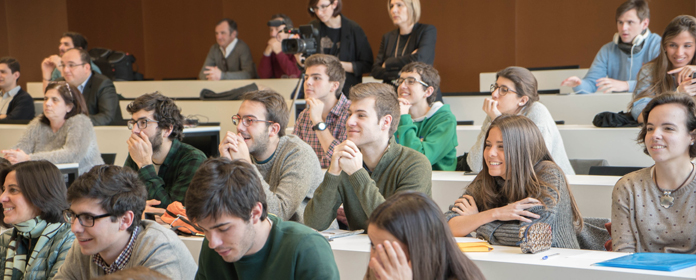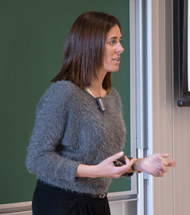Edurne Pasaban: "The most important thing was sharing all 14 eight-thousanders with my team"
The first woman to scale the 14 tallest mountains on the planet visits the University as the School of Economics and Business Administration celebrates the feast of its patron saint


At a lecture at the University of Navarra, Edurne Pasaban, the first woman in the history of mountain climbing to reach the summit of all 14 eight-thousanders, stressed that both in climbing and everyday life, "the most important thing is your team." The lecture was held as part of the School of Economics and Business Administration's annual celebration of its patron saint's feast day.
"The best teams always have the best people. And they won't leave you hanging at 7,500 meters," Pasaban said. Though most corporate teams do not work at that altitude, the parallels with the business world were clear. In her lecture, Pasaban recounted one of the toughest experiences of her life: her 2009 descent from Kanchenjunga, the third tallest mountain in the world. When she found herself unable to walk, she told her team to leave her on the mountainside. "That was when my team decided to ditch all their gear – ropes, cameras – and carry me all the way down to base camp."
Thinking back over her career, Pasaban said that a strong team's first priorities should be communication, trust, knowing how to ask for help, being a good listener, giving credit to others and learning how to manage change. She also recommended being transparent and facing uncomfortable conversations head-on. Any other approach, she warned, risks team unity.
Since she chose climbing, something she is truly passionate about, she has urged students to follow their hearts. "Everyone needs to have ambition," she insisted. "If I hadn't, I would never have reached the top of 14 eight-thousanders." She admitted she had suffered from depression when she left her career as an engineer to climb mountains. She worried it was the wrong decision.
In 2004, she received a phone call from Sebastián Álvaro, who was then the director of the Spanish television program Al filo de lo imposible (On the Edge of the Impossible), to tell her about "a tremendous opportunity." He suggested she climb K2, the second highest mountain in the world, even though K2 is known for tragedy. "When faced with a mountain like K2, which we all have to climb at some point in our lives, though the challenge may take different forms, we can choose one of two roles: victim or hero. Victims say, ‘I can't' when confronted with difficult challenges. But heroes say, ‘Why not? I'll give it a shot.'"
